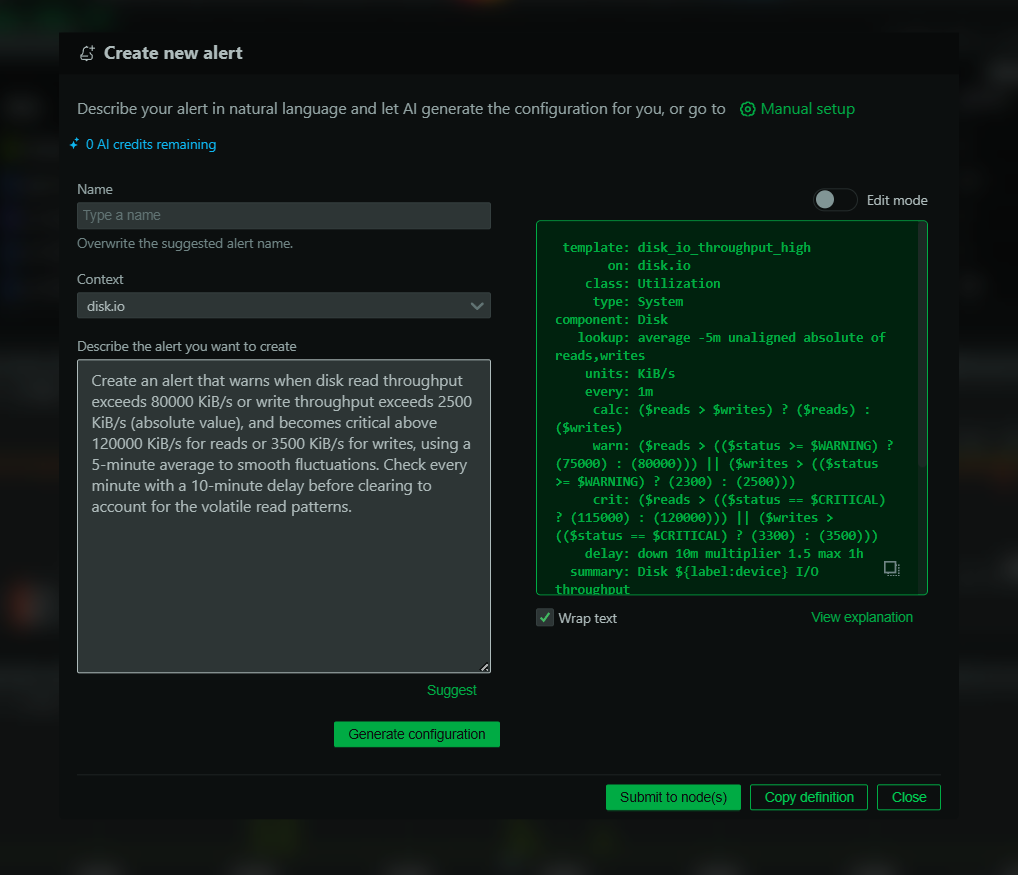| vernemq.node_mqtt_auth | received, sent | packets/s |
| vernemq.node_mqtt_auth_received_by_reason_code | success, continue_authentication, reauthenticate | packets/s |
| vernemq.node_mqtt_auth_sent_by_reason_code | success, continue_authentication, reauthenticate | packets/s |
| vernemq.node_mqtt_connect | connect, connack | packets/s |
| vernemq.node_mqtt_connack_sent_by_return_code | success, unsupported_protocol_version, client_identifier_not_valid, server_unavailable, bad_username_or_password, not_authorized | packets/s |
| vernemq.node_mqtt_connack_sent_by_reason_code | success, unspecified_error, malformed_packet, protocol_error, impl_specific_error, unsupported_protocol_version, client_identifier_not_valid, bad_username_or_password, not_authorized, server_unavailable, server_busy, banned, bad_authentication_method, topic_name_invalid, packet_too_large, quota_exceeded, payload_format_invalid, retain_not_supported, qos_not_supported, use_another_server, server_moved, connection_rate_exceeded | packets/s |
| vernemq.node_mqtt_disconnect | received, sent | packets/s |
| vernemq.node_mqtt_disconnect_received_by_reason_code | normal_disconnect, disconnect_with_will_msg, unspecified_error, malformed_packet, protocol_error, impl_specific_error, topic_name_invalid, receive_max_exceeded, topic_alias_invalid, packet_too_large, message_rate_too_high, quota_exceeded, administrative_action, payload_format_invalid | packets/s |
| node_mqtt_disconnect_sent_by_reason_code | normal_disconnect, unspecified_error, malformed_packet, protocol_error, impl_specific_error, not_authorized, server_busy, server_shutting_down, keep_alive_timeout, session_taken_over, topic_filter_invalid, topic_name_invalid, receive_max_exceeded, topic_alias_invalid, packet_too_large, message_rate_too_high, quota_exceeded, administrative_action, payload_format_invalid, retain_not_supported, qos_not_supported, use_another_server, server_moved, shared_subs_not_supported, connection_rate_exceeded, max_connect_time, subscription_ids_not_supported, wildcard_subs_not_supported | packets/s |
| vernemq.node_mqtt_subscribe | subscribe, suback | packets/s |
| vernemq.node_mqtt_subscribe_error | subscribe | errors/s |
| vernemq.node_mqtt_subscribe_auth_error | subscribe_auth | errors/s |
| vernemq.node_mqtt_unsubscribe | unsubscribe, unsuback | packets/s |
| vernemq.node_mqtt_unsubscribe_error | unsubscribe | errors/s |
| vernemq.node_mqtt_publish | received, sent | packets/s |
| vernemq.node_mqtt_publish_errors | publish | errors/s |
| vernemq.node_mqtt_publish_auth_errors | publish_auth | errors/s |
| vernemq.node_mqtt_puback | received, sent | packets/s |
| vernemq.node_mqtt_puback_received_by_reason_code | success, no_matching_subscribers, unspecified_error, impl_specific_error, not_authorized, topic_name_invalid, packet_id_in_use, quota_exceeded, payload_format_invalid | packets/s |
| vernemq.node_mqtt_puback_sent_by_reason_code | success, no_matching_subscribers, unspecified_error, impl_specific_error, not_authorized, topic_name_invalid, packet_id_in_use, quota_exceeded, payload_format_invalid | packets/s |
| vernemq.node_mqtt_puback_invalid_error | unexpected | messages/s |
| vernemq.node_mqtt_pubrec | received, sent | packets/s |
| vernemq.node_mqtt_pubrec_received_by_reason_code | success, no_matching_subscribers, unspecified_error, impl_specific_error, not_authorized, topic_name_invalid, packet_id_in_use, quota_exceeded, payload_format_invalid | packets/s |
| vernemq.node_mqtt_pubrec_sent_by_reason_code | success, no_matching_subscribers, unspecified_error, impl_specific_error, not_authorized, topic_name_invalid, packet_id_in_use, quota_exceeded, payload_format_invalid | packets/s |
| vernemq.node_mqtt_pubrec_invalid_error | unexpected | messages/s |
| vernemq.node_mqtt_pubrel | received, sent | packets/s |
| vernemq.node_mqtt_pubrel_received_by_reason_code | success, packet_id_not_found | packets/s |
| vernemq.node_mqtt_pubrel_sent_by_reason_code | success, packet_id_not_found | packets/s |
| vernemq.node_mqtt_pubcomp | received, sent | packets/s |
| vernemq.node_mqtt_pubcomp_received_by_reason_code | success, packet_id_not_found | packets/s |
| vernemq.node_mqtt_pubcomp_sent_by_reason_cod | success, packet_id_not_found | packets/s |
| vernemq.node_mqtt_pubcomp_invalid_error | unexpected | messages/s |
| vernemq.node_mqtt_ping | pingreq, pingresp | packets/s |









